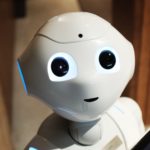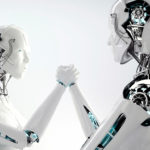Robots: friends or nightmare?
China is set to lead the global production of robots, followed by Europe and USA. But the debate over the potential benefits and risks of humanoids is already raging.

The robotics revolution is supposed to come in 2030, but you won't need to wait that long to see signs of coexistence between humans and robots. In two years China will lead global robot production, churning out close to 400,000 units, well ahead of the 340,000 that Europe is expected to produce and the 300,000 set to be built in the United States, according to figures from the International Federation of Robotics (IFR).
Will robots become man's best friend, or his nightmare? This is the question that is always raised whenever we see a boom in robotics, and all sorts of answers are always proffered. According to the scientist Stephen Hawking, robots represent a “threat to humanity. Humans, who are limited by slow biological evolution, couldn't compete, and would be superseded," he cautioned in this interview for the BBC.

The physicist has been warning of the risks inherent in artificial intelligence for years, and this June he presented a letter in Buenos Aires that rallied against the development of so called "killer robots". The open letter, signed also by Apple co-founder Steve Wozniak, founder of Tesla and co-creator of PayPal Elon Musk, the linguist Noam Chomsky and Demis Hassabis, Chief Executive of the Google artificial intelligence firm, stated the concerns harbored by thousands of scientists due to the development of autonomous military robots, capable of operating without human intervention.
“It is only a matter of time before the weapons end up in the hands of terrorists and warlords (...), autonomous weapons have been described as the third revolution in warfare, after gunpowder and nuclear arms (...), autonomous weapons are ideal for tasks such as assassinations, destabilizing nations, subduing populations and selectively killing a particular ethnic group (...). Starting a military AI arms race is a bad idea," warns the letter.
Although Hawking is not entirely against humanoids and admits that the potential benefits could be "enormous", he cautions that current robot development is channeled more toward the destruction of people. “Artificial intelligence could serve to eradicate war, disease and poverty from the world. However, we are seeing priority given to investments that will usher in an arms race,” he said.
Leaving aside military purposes and concentrating instead on industrial uses, this report from the Pew Research Center, based on interviews with around 2,000 tech experts, scientists and academics, found that half of those surveyed believe that machines will perform much of the tasks now done by humans, while the other half expect robots to create more jobs. The report concluded that 2025 will be the year in which robots play a very significant role in people's lives. A more recent study found that humanoids would take away 18 million jobs in Germany within 20 years.
“The human robot”
Rodolphe Gelin, Director of Aldebaran Robots, is more optimistic. He points out that humanoids have "a heart" and will represent the backbone of smart homes, controlling lighting, temperature, cleaning and food, providing the chief interface for operating electronic appliances.
Aldebaran's robots are social and programmed to learn humans' habits and intervene when necessary. Their artificial intelligence allows them to interact with people via voice and even recognize emotions. According to Gelin, the fears that robots arouse are unjustified: "Like any object or technology developed by man, robots could pose a threat to humanity. Fire, cars, electricity, nuclear energy and even writing can do both good and bad for humanity. It all depends on what you do with it. Robots intrinsically do not pose a danger to humanity."
Instead, he believes “robots will build a better future. They will bring out the best in people. There are fears, such as of a spontaneous robot rebellion, or robots being put to bad use as a result of piracy. But such problems are not specific to robots; they apply to all smart objects with which we interact. Computer researchers, specialists in IT security and even attorneys are working to resolve such problems even before we begin living with robots. It is very important that everyone understand the foundations of robots. Fear is often born of ignorance. If every child is made familiar with robots, just as they are taught to use the Internet properly, they will dominate robotics. And the future of robotics will be in good hands: those of the people," he concludes.